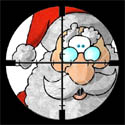Well, let me get all my Scrooge tendencies out of the way now, because I really do enjoy Christmas and don't want to make such a negative post closer to the holiday. By the way, I was planning on making this post even before I saw Eric's recent entry over at The New Minority.
 Every year around this time, you seem to get the grumpy old men types complaining about the War on Christmas, or how commercialization is ruining the true meaning of the season. Man, I wish those people could learn a bit of history and see just how silly they sound.
Every year around this time, you seem to get the grumpy old men types complaining about the War on Christmas, or how commercialization is ruining the true meaning of the season. Man, I wish those people could learn a bit of history and see just how silly they sound.
First, they get upset about the semantics of the whole thing, claiming that people aren't saying 'Merry Christmas' in a deliberate attempt to make the holiday more secular. Season's Greetings has been in use since the 19th century. I kind of doubt the secularists have been planning their strategy that long. I remember seeing 'Happy Holidays' on Christmas cards ever since I was a kid, back before 'the War' got started, and always just assumed it was shorter than writing 'Merry Christmas and a Happy New Year' (or you can add in Boxing Day if you're British). A few years ago, in a previous entry, I even mentioned a guy at my wife's work, who caught a bunch of flak from his coworkers for having Christmas cards that said 'Happy Holidays' instead of 'Merry Christmas,' even though the cards had Bible verses on them. Then there are the people that get upset about Xmas. Damn those 11th century monks who thought they could abbreviate 'Christ' with the Greek letter, chi. They probably thought the Chi-Ro was a good symbol for Christ, too.
Do these people even realize where many of our Christmas traditions come from, anyway? First, there's the timing. Don't they think it's a bit suspicious that the holiday falls so close to the Winter Solstice? I realize the gospels don't explicitly state when the nativity story was supposed to have taken place, but shepherds sleeping in the field at night doesn't seem like a great winter activity. And then there are all the Pagan holidays that also fall right around that time, such as Saturnalia from the 17th to to 23rd, or even Mithra's birthday (who was also known as the 'light of the world') on the 25th.
Skipping past the Romans up to the northern Europeans who started many of our Christmas traditions, even the term 'Yule Tide' comes from pagan roots. Yule was originally a late December/early January Germanic/Norse holiday honoring their gods. Odin's Wild Hunt may have even contributed to the legend of Santa Claus making his late night journey. Likewise, Christmas trees, mistletoe, and hanging evergreen clippings & wreaths also seems to be an incorporation of pagan Germanic traditions. (If you want to read what the Bible has to say about decorating a tree in your house, check out Jeremiah 10:1-5.) Many sources even claim, although I'm not sure if this is reliable or merely an urban legend, that in the 4th century, Pope Julius I officially declared Christmas to be on the 25th of December in a deliberate attempt to get pagans to start switching over to Christianity. Whatever the case, whether deliberate or not, it certainly seems that many of our Christmas traditions began as pagan winter solstice traditions.
How about the history of how Christmas has been treated on this continent? The Puritan Pilgrims, who have taken on an almost mythical aspect as the founders of our country, outlawed the celebration of Christmas from 1659 to 1681. Various Christian sects throughout our nation's history (see the same article as linked above) have also refrained from celebrating Christmas. Our founding fathers didn't see fit to declare Christmas a national holiday, and the 1st Congress worked straight through that particular day (as did many subsequent Congresses - in fact, Christmas wasn't declared a national holiday until 1870). Actually, for many of those that did celebrate Christmas, it didn't take on its warm & fuzzy family feel until the late 1800s. Prior to that, many in the U.S. followed a tradition from the Middle Ages of getting drunk and acting raucously. To quote from that article I just linked to, "In the early part of the 19th century, Christmas was, as one historian once noted, 'like a nightmarish cross between Halloween and a particularly violent, rowdy Mardi Gras.' In fact, a massive Christmas riot in 1828 led to the formation of New York City's first police force." Certainly not everyone became a drunken vandal on Christmas, just like not everyone ignored it like the Puritans or some other Protestant groups, but Christmas certainly hasn't been celebrated universally throughout our country's history in the same way it is now.
I also get tired of the persecution complex that the people who buy into the War on Christmas seem to have. Christians make up around 80% of the U.S. population. As far as representation in government, in the 109th Congress, there were 11 senators who didn't identify themselves as Christians (12 if you count Unitarians), and only 30 representatives in the House (32 if you count Unitarians). In other words, over 90% of the elected officials in the federal legislative branch are Christians. You have to go back all the way to Taft to find a president who said, "I do not believe in the divinity of Christ" (though he was still a Unitarian Christian), or all the way back to Lincoln to find a deist president, and it seems absurd to imagine a non-Christian being elected to that office anytime soon. Christians make up a very large segment of the population, and are actually over-represented in government. They are not an oppressed minority.
Okay, with all that out of my system, I just want to be sure to mention that this was not directed at Christians or Christmas in general. It was aimed at the oversensitive vocal minority who seem to think that the First Amendment only applies to people who agree with them (though perhaps that's not as small of a minority as I would like). Personally, I like Christmas. We've decorated all the rooms in the house, put up our Christmas tree, hung our lights outside, given money to the Salvation Army, donated to food drives, bought presents for friends & family, and all the other things that people like to do around this time of year. I even tell people 'Merry Christmas.' I just wish people would quit being so ignorant.
Updated 2008-12-19: In the section on pagan origins, I added everything from the Pope Julius reference to the end of the paragraph. I also made a few minor changes to the section on the history of Christmas in this country, as well as adding the final sentence to that paragraph, just to clarify things. Since I linked to so many other pages in this post, I'll make special mention here of one of those links in particular (which was also pointed out in the comments) - the Slate article was very good, and worth reading even if you don't follow any of the other links.
 However you decide to celebrate the winter solstice, I wish you a happy holiday. And if you don't celebrate anything, just have a good time, anyway.
However you decide to celebrate the winter solstice, I wish you a happy holiday. And if you don't celebrate anything, just have a good time, anyway.
 Every year around this time, you seem to get the grumpy old men types complaining about the War on Christmas, or how commercialization is ruining the true meaning of the season. Man, I wish those people could learn a bit of history and see just how silly they sound.
Every year around this time, you seem to get the grumpy old men types complaining about the War on Christmas, or how commercialization is ruining the true meaning of the season. Man, I wish those people could learn a bit of history and see just how silly they sound.
 I've made a new factoids page,
I've made a new factoids page,  Well, I managed to be pretty much on time updating the list this month. Like normal, most of the popular pages stayed popular, shifting rankings just a little bit. The big surprise this month is that
Well, I managed to be pretty much on time updating the list this month. Like normal, most of the popular pages stayed popular, shifting rankings just a little bit. The big surprise this month is that